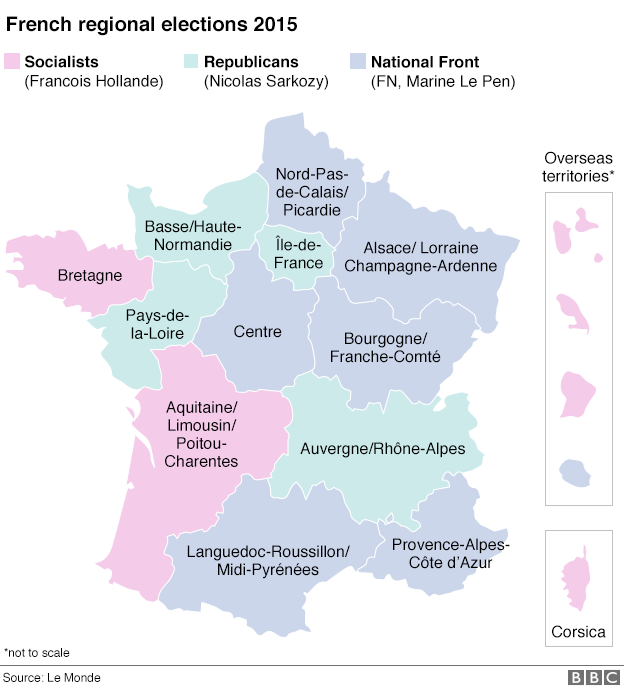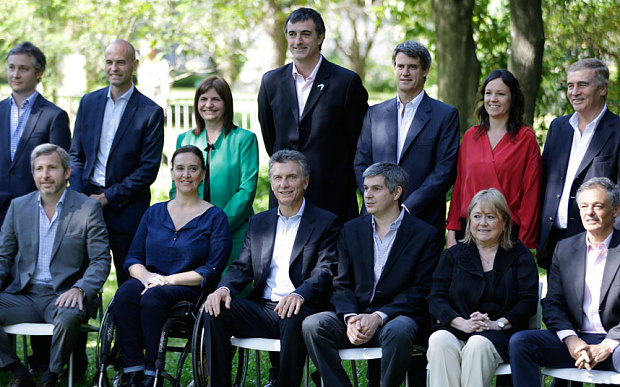News from France, Venezuela and Argentina
Tuesday's World Events — Posted on December 8, 2015
FRANCE – French news ‘shocked’ as far right dominates regional polls
Newspapers across France’s political spectrum* expressed “shock” on Monday following the victory of Marine Le Pen’s far-right National Front (FN) party in Sunday’s first round of regional elections. (*political spectrum: those who endorse policies from very liberal to very conservative)
The anti-European Union and anti-immigration FN [National Front party] scored just over 28% of the ballot, claiming a lead in six of 13 regions in mainland France.
The party was ahead of the conservative mainstream led by former president Nicolas Sarkozy (27%) and the ruling Socialists (23.5%).
No one party scored the 50% needed to secure outright victory in the first round. The second round will take place this coming Sunday.
For the first time ever, right-wing establishment newspaper Le Figaro and communist mouthpiece Humanité used exactly the same headline, which read simply: “Shock.”
“The FN has become France’s first party,” commiserated regional daily Le Journal de Haute-Marne. “It is a protest vote against the (socialist) establishment, but also against an ineffective, irrelevant (conservative) opposition.”

Source: Le Monde
The French electoral system has always tended to keep the far right from power, with voters rallying against the National Front in second rounds.
But the prognosis (prediction) for next Sunday’s second round is less clear.
Catholic newspaper La Croix blasted those who failed to vote (just under half the electorate): “All voters should ask themselves: ‘Is this an acceptable situation?’ Whatever the answer to that question is, go out and vote (in the second round).”
Eastern daily newspaper Republicain Lorrain also challenged its readers to get engaged in the second round: “The FN [political party] has won the first round, but has it secured next Sunday’s vote? Nothing is certain.”
The FN’s repeated linking of immigration with terrorism has also helped it climb in the polls since the gun and suicide bombing assaults in Paris on November 13.
When it emerged that at least two of the attackers had entered Europe posing as Syrian refugees, the FN, which has been working to get rid of its image as a racist and openly anti-Semitic party, aggressively pushed a message of “we told you so.”
VENEZUELA – Opposition thrashes ‘Chavismo’ socialists in landslide win
Venezuela’s opposition trounced the ruling Socialists on Sunday to win the legislature for the first time in 16 years and gain a long-sought platform to challenge President Nicolas Maduro’s rule of the OPEC nation. [OPEC – Organization of the Petroleum Exporting Countries]
The opposition Democratic Unity coalition won 99 seats to the Socialists’ 46 in the 167-national National Assembly, the election board said, with some districts still to be counted.
Fireworks were set off in celebration in pro-opposition districts of Caracas when the results were announced, while government supporters dismantled planned victory parties.
Mr. Maduro, 53, quickly acknowledged the defeat, the worst for the ruling “Chavismo” movement since its founder Hugo Chavez took power in 1999.
“We are here, with morals and ethics, to recognize these adverse results,” Mr. Maduro said in a speech to the nation, although he blamed his defeat on a campaign by business leaders and other opponents to sabotage the economy. “The economic war has triumphed today,” Mr. Maduro said.
His quick acceptance of the results eased tensions in the volatile nation where the last presidential election in 2013, narrowly won by Mr. Maduro, was bitterly disputed and anti-government protests last year led to 43 deaths.
Opposition leaders, who have lost over-and-over since Chavez’s first election victory 17 years ago, were jubilant, even though (according to this reporter) their victory was mainly thanks to public disgust at Venezuela’s deep economic recession.
“We’re going through the worst crisis in our history,” coalition head Jesus Torrealba said. “Venezuela wanted a change and that change came … a new majority expressed itself and sent a clear and resounding message.”
Opposition sources predicted that once counting was finalized, they would win as many as 113 seats. That would give them a crucial two-thirds majority needed to shake up institutions such as the courts or election board.
The result could also embolden government opponents to seek a recall election against Mr. Maduro in 2016 if they can gather the nearly four million signatures needed to initiate the referendum.
The Democratic Unity coalition capitalized on discontent among Venezuela’s 29 million people with the world’s highest inflation and product shortages.
Critics say failed socialist policies, including nationalizations, rigid currency controls, and hostility towards the private sector spurred the economic crisis and that it was then exacerbated by a global slump in oil prices. Venezuela depends on crude for 96 per cent of its export revenue.
The government’s defeat was another blow to Latin America’s left following last month’s swing to the center-right in Argentina’s presidential election. South America’s bloc of left-wing governments, dominant for over a decade, has lost some of its clout this year.
Center-right opposition candidate Mauricio Macri won Argentina’s presidential election last month, ending 12 years of left-wing rule, and Brazil’s leftist President Dilma Rousseff is battling impeachment for alleged corruption.
Venezuela’s opposition [opposed to the socialist governement] will now have the chance to break the ruling party’s control over the budget and seek amnesty for dozens of jailed activists, including political prisoner and former Venezuelan politician Leopoldo Lopez.
“I’m so happy,” said his beaming wife, Lilian Tintori, who has become a prominent campaigner for the opposition.
ARGENTINA – Out-going President Cristina Kirchner ‘creating as many problems as possible for the new government’
Mauricio Macri, who on Thursday will be sworn in as the new president of Argentina, is engaged in a public dispute with Cristina Kirchner – who he accuses of sabotaging his new government.
“It seems the idea is to fill the transition process with obstacles and create as many problems as possible for the new government,” said Mr. Macri, whose election on November 22 marked a failure for Mrs. Kirchner to install her chosen socialist successor, Daniel Scioli.

Argentina’s President-elect Mauricio Macri, front third from left, sits with some members of his nominated new cabinet at the botanical gardens in Buenos Aires, Argentina
Mr. Macri, mayor of Buenos Aires and former president of Boca Juniors football [soccer] club, complains that Mrs. Kirchner is obstructing access to public accounts and hampering a smooth transition.
“This is a sad choice that the president has made. Everything she does that she thinks will hurt our government will in reality hurt all Argentines,” he added.
Kirchner has approved the delegation of billions of dollars of spending to provincial governors. With ten days to go until the December 10 handover, she changed the budget for the next year, with increased spending on Congress, the judiciary, the security forces and her prized social plans including Football For All – a program which shows free football matches, alongside political messages.
The decree, 2585, signaled a surge in spending which she said was necessary for the cabinet to “guarantee the fulfilling of its objectives while in power.”
She has appointed a slew of new ambassadors – to Cuba, Australia and the UAE – which, as political appointees, can be replaced by Mr. Macri, but present a headache.
Alejandro Vanoli, the combative president of the central bank, was expected to resign – as many of Mrs. Kirchner’s appointees have done – but is clinging on.
And even the handover ceremony has been contentious, with Mrs. Kirchner planning on holding a final “farewell” rally on Wednesday night, followed by a handover in Congress on Thursday.
Mr. Macri wants the handover to be at the Casa Rosada presidential palace.
Mrs. Kirchner has hit back against Mr. Macri’s allegations, accusing Mr. Macri on Sunday of “shouting” at her on the phone. “I must confess that I was surprised by the shouting of the president-elect,” she said, in a lengthy letter published on her website on Sunday. “I had to remind him at one point that beyond our statures, he was a man and I a woman and he had no right to treat me in this way.”
Her role after the election is unclear. She has not, unlike many previous presidents, sought immunity through a seat in the Senate. When asked on election day what her plans were, she replied: “I will carry on the fight.”
(The news briefs above are from wire reports and staff reports posted at France24 on Dec. 7, London’s Daily Telegraph on Dec. 7.)
Background
FRANCE
The National Front (or FN) party is a socially conservative, and nationalist, right to far-right political party in France. Its major policies include economic protectionism, a zero tolerance approach to law and order issues, and anti-immigration. A eurosceptic party, the FN has opposed the European Union since its creation in 1993. (read more at Wikipedia)
VENEZUELA
More from the Telegraph article above:
With inflation believed to be in triple digits, vast lines outside supermarkets owing to shortages of basic goods and an 80 per cent collapse of the currency on the black market, it was the economy that turned Venezuelans away from the government.
Underlining the depth of feeling, videos circulating online seemed to show five prominent socialist politicians – including Chavez's brother Adan – being booed at voting centres on Sunday, with crowds yelling "the government will fall!" or "thief!".
"I voted because we want a change in this country. We're bored of so many queues, food shortages, a minimum wage that doesn't get us anywhere," said Cristobal Jesus Medina Chacon, a 27-year-old engineer who arrived at his voting station in the western city of San Cristobal at 4am.
Read below from a commentary “Venezuela Votes: Understanding The Outcomes Of A Momentous Day” from Forbes.com:
Sunday's parliamentary election is the first major defeat of the socialist party in Venezuela in 17 years, and since it represented a turnout of almost 74% of the eligible population, can be said to be unquestionably representative.
The easy [part] is explaining why they voted this way:
- There are chronic shortages everywhere.
- In a country with supposedly the largest oil reserves in the world, people queue around the block for goods that most likely won’t be there to buy when they get to the front.
- They can’t get medicine, or parts to fix their cars.
- Inflation runs at anything from 200% to 600%, depending on who you believe, and the currency – at least officially, if not always in practice – has lost four fifths of its value this year alone.
- Violence has plagued the run-up to the poll.
- And socialist President Nicolas Maduro’s response – that it was “not the opposition who triumphed, but circumstantially a counter-revolution has triumphed” – amplifies the sense of somebody who has lost the ability to decipher the national mood.
FRANCE
The Socialist Party has already instructed its candidates in three regions to pull out of the run-off contest in a bid to bar the FN (National Front party) from power.
But Nicolas Sarkozy, who leads the conservative Les Républicains, has refused to give similar instructions in regions where the Socialists have a better chance of beating the far right [by letting the conservatives win because they know they cannot win].
“Nothing would be worse for the right to be seen to be cosying up with the Socialists in a ‘Republican soup’,” the right-leaning Figaro newspaper said on Monday.
Other newspapers, however, expressed the need for voters to support candidates they would otherwise abhor in order to keep Marine Le Pen’s party from the gates of power.
Left-leaning Libération said that “anyone who values the Republic should understand that we face the worst possible situation … we must do anything to avoid it.”
Communist daily Humanité expressed the same sentiment: “Wherever the FN threatens, vote against it without any hesitation.” (from the France24 article above)
